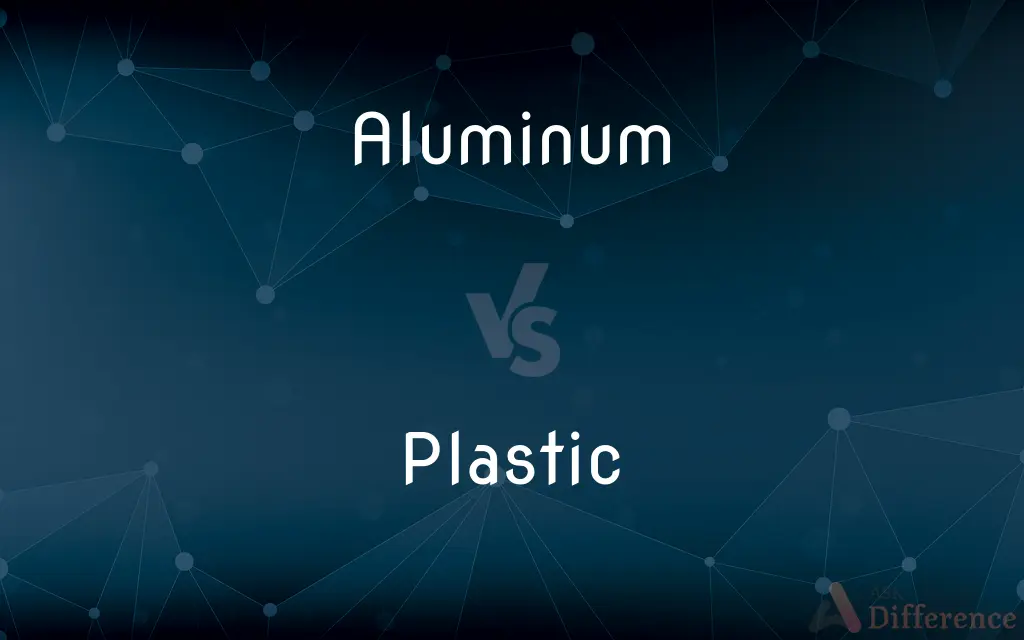Aluminum vs. Plastic — What's the Difference?
By Tayyaba Rehman — Updated on September 24, 2023
"Aluminum" is a lightweight, silvery-white metal element, while "Plastic" refers to synthetic or semi-synthetic materials that can be molded.

Difference Between Aluminum and Plastic
Table of Contents
ADVERTISEMENT
Key Differences
"Aluminum" and "Plastic" are terms that refer to entirely different materials with diverse properties and uses. Aluminum is a chemical element with the symbol "Al" and atomic number 13. It is a silver-white, ductile metal known for its corrosion resistance, making it ideal for various applications like cans, foils, and airplane parts. Aluminum conducts electricity well and is often used in wiring and electrical components.
Plastic, on the other hand, is a broad class of synthetic or semi-synthetic organic materials. It can be molded or shaped when soft and then solidified. Its versatility in being molded into various shapes and forms has led to its widespread use in numerous applications, from packaging to automotive parts. Plastics can be clear, opaque, flexible, or rigid based on their specific chemical compositions.
While aluminum is extracted from the Earth's crust, primarily from bauxite ore, plastic is typically derived from petrochemicals. This means that the production processes for each are distinct, with aluminum being smelted and plastic being polymerized.
In terms of environmental impact, both materials present challenges. Aluminum production can be energy-intensive, while plastic, especially single-use plastic, poses waste management and pollution challenges. Nevertheless, both aluminum and plastic are recyclable, although the rates and methods of recycling vary.
Comparison Chart
Material Type
Metal.
Organic polymer.
ADVERTISEMENT
Origin
Extracted from bauxite ore.
Derived from petrochemicals.
Malleability
Ductile and can be rolled into sheets.
Can be molded when soft.
Thermal Conductivity
High (good conductor of heat).
Typically low (insulator).
Environmental Concerns
Energy-intensive production.
Pollution due to non-biodegradable waste.
Compare with Definitions
Aluminum
A silver-white, ductile metal element.
Aluminum is used to make aircraft parts due to its lightweight nature.
Plastic
Resistant to moisture and chemicals.
Plastic containers are ideal for storing household cleaners.
Aluminum
A good conductor of electricity.
Aluminum wiring is found in many electrical systems.
Plastic
Plastics are a wide range of synthetic or semi-synthetic materials that use polymers as a main ingredient. Their plasticity makes it possible for plastics to be moulded, extruded or pressed into solid objects of various shapes.
Aluminum
Corrosion-resistant metal.
Aluminum boats resist rust and corrosion when in water.
Plastic
A synthetic material made from a wide range of organic polymers such as polyethylene, PVC, nylon, etc., that can be moulded into shape while soft, and then set into a rigid or slightly elastic form
Mains pipes should be made of plastic or copper
Bottles can be made from a variety of plastics
Aluminum
Extracted primarily from bauxite ore.
Bauxite mining is the first step in aluminum production.
Plastic
Made of plastic
Plastic bottles
Aluminum
Widely recycled metal.
Aluminum cans are often collected and recycled into new products.
Plastic
(of a substance or material) easily shaped or moulded
Rendering the material more plastic
Aluminum
A silvery-white, ductile metallic element, the most abundant in the earth's crust but found only in combination, chiefly in bauxite. Having good conductive and thermal properties, it is used to form many hard, light, corrosion-resistant alloys. Atomic number 13; atomic weight 26.9815; melting point 660.32°C; boiling point 2,519°C; specific gravity 2.70; valence 3. See Periodic Table.
Plastic
Capable of being shaped or formed
Plastic material such as clay.
Aluminum
Standard spelling of aluminium
Plastic
Relating to or dealing with shaping or modeling
The plastic art of sculpture.
Aluminum
The metallic element forming the base of alumina. This metal is white, but with a bluish tinge, and is remarkable for its resistance to oxidation, and for its lightness, having a specific gravity of about 2.6. Atomic weight 27.08. Symbol Al. Also called aluminium.
Plastic
Having the qualities of sculpture; well-formed
"the astonishing plastic beauty of the chorus girls" (Frank Harris).
Aluminum
A silvery ductile metallic element found primarily in bauxite
Plastic
Giving form or shape to a substance
The plastic forces that create and wear down a mountain range.
Plastic
Easily influenced; impressionable
"The plastic mind of the bank clerk had been ... distorted by what he had read" (Rudyard Kipling).
Plastic
Made of a plastic or plastics
A plastic garden hose.
Plastic
(Physics) Capable of undergoing continuous deformation without rupture or relaxation.
Plastic
Capable of building tissue; formative.
Plastic
Able to change and adapt, especially by acquiring alternative pathways for sensory perception or motor skills. Used of the central nervous system.
Plastic
Marked by artificiality or superficiality
A plastic world of fad, hype, and sensation.
Plastic
(Informal) Of or obtained by means of credit cards
Plastic money.
Plastic
Any of various organic compounds produced by polymerization, capable of being molded, extruded, cast into various shapes and films, or drawn into filaments used as textile fibers.
Plastic
(Informal) A credit card or credit cards
Would accept cash or plastic in payment.
Plastic
A synthetic, solid, hydrocarbon-based polymer, whether thermoplastic or thermosetting.
Plastic
Credit or debit cards used in place of cash to buy goods and services.
Plastic
Insincerity; fakeness, or a person who is fake or arrogant, or believes that they are better than the rest of the population.
Plastic
An instance of plastic surgery.
Plastic
(obsolete) A sculptor, moulder.
Plastic
(archaic) Any solid but malleable substance.
Plastic
Capable of being moulded; malleable, flexible, pliant.
Plastic
Producing tissue.
Plastic
(dated) Creative, formative.
Plastic
(biology) Capable of adapting to varying conditions; characterized by environmental adaptability.
Plastic
Of or pertaining to the inelastic, non-brittle, deformation of a material.
Plastic
Made of plastic.
Plastic
Inferior or not the real thing.
Plastic
Fake; insincere.
Plastic
Having the power to give form or fashion to a mass of matter; as, the plastic hand of the Creator.
See plastic Nature working to his end.
Plastic
Capable of being molded, formed, or modeled, as clay or plaster; - used also figuratively; as, the plastic mind of a child.
Plastic
Pertaining or appropriate to, or characteristic of, molding or modeling; produced by, or appearing as if produced by, molding or modeling; - said of sculpture and the kindred arts, in distinction from painting and the graphic arts.
Medallions . . . fraught with the plastic beauty and grace of the palmy days of Italian art.
Plastic
A substance composed predominantly of a synthetic organic high polymer capable of being cast or molded; many varieties of plastic are used to produce articles of commerce (after 1900). [MW10 gives origin of word as 1905]
Plastic
Generic name for certain synthetic or semisynthetic materials that can be molded or extruded into objects or films or filaments or used for making e.g. coatings and adhesives
Plastic
Used of the imagination;
Material...transformed by the plastic power of the imagination
Plastic
Capable of being molded or modeled (especially of earth or clay or other soft material);
Plastic substances such as wax or clay
Plastic
Capable of being influenced or formed;
The plastic minds of children
A pliant nature
Plastic
A synthetic or semi-synthetic malleable material.
The toy was made of colorful plastic.
Plastic
Derived mainly from petrochemicals.
The production of plastic is closely linked to the oil industry.
Plastic
Capable of being molded into various forms.
Plastic bottles take on different shapes and sizes.
Plastic
Often associated with environmental pollution concerns.
Plastic waste is a significant contributor to ocean pollution.
Common Curiosities
Which is heavier, aluminum or plastic?
Generally, aluminum is heavier than many plastics, but it's lighter than many other metals.
Why is plastic so widely used?
Plastic's versatility, moldability, and cost-effectiveness make it a popular material choice.
Are there biodegradable plastics?
Yes, some plastics are designed to be biodegradable, breaking down more easily in the environment.
Are all plastics harmful to the environment?
Not all, but many single-use plastics pose environmental concerns due to their persistence in ecosystems.
What are the health concerns associated with using aluminum?
While aluminum is generally safe, prolonged exposure or ingestion in large amounts can pose health concerns.
Is aluminum a natural metal?
Yes, aluminum is a naturally occurring metal found in bauxite ore.
Is plastic a good insulator?
Yes, many plastics are good insulators and resist the flow of electricity and heat.
Can both aluminum and plastic be recycled?
Yes, both materials are recyclable, although the methods and rates differ.
Which is more expensive to produce, aluminum or plastic?
Production costs vary based on factors like location and market demand, but aluminum extraction can be energy-intensive.
Why is aluminum used in cookware?
Aluminum conducts heat well, making it a popular choice for cookware.
Share Your Discovery

Previous Comparison
Qudit vs. Qubit
Next Comparison
Maximum vs. LargestAuthor Spotlight
Written by
Tayyaba RehmanTayyaba Rehman is a distinguished writer, currently serving as a primary contributor to askdifference.com. As a researcher in semantics and etymology, Tayyaba's passion for the complexity of languages and their distinctions has found a perfect home on the platform. Tayyaba delves into the intricacies of language, distinguishing between commonly confused words and phrases, thereby providing clarity for readers worldwide.














































